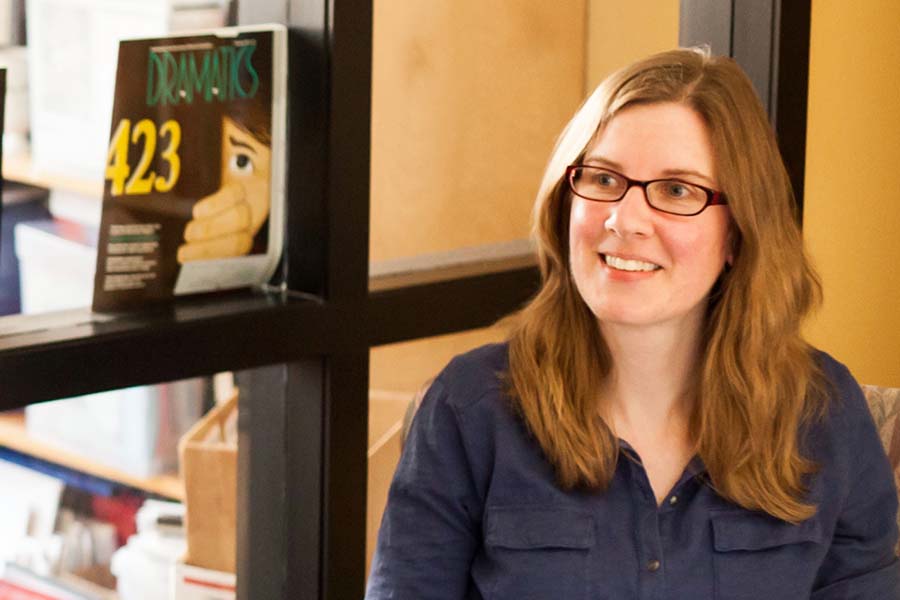A few weeks before jockeys and wide-brimmed hats descend upon Kentucky’s largest city for the Derby, Louisville teems with theatregoers from across the globe gathering at Actors Theatre of Louisville for the annual Humana Festival of New American Plays. The two-month-long festival has been launching six world premiere productions each spring since 1976.
Among the many humans behind the Humana operation is Amy Wegener, the company’s literary director, who has been part of the festival’s fold since 1997. This pinnacle event for the company, with all its excitement and field-wide attention, is old hat for Wegener: the 2018 festival, which began on Feb. 28 and runs through April 8, is her 17th. Her first professional theatre job, in fact, was at ATL when she was hired to assist the literary manager just six months after getting her master’s degree at Northwestern University.
“It was very serendipitous then, even more so in retrospect, that I landed in a place with such a dedication to training the next generation and to new-play dramaturgy,” says Wegener.
She’s since filled the roles of staff dramaturg, director of new-play development, literary manager, and literary director—a title she’s held since 2010. (She served as literary manager at the Guthrie Theater in Minneapolis from 2003 to 2007 before returning to Actors Theatre in the same position.) Throughout her Louisville tenure, she’s worked with all three of the institution’s artistic directors: Jon Jory, Marc Masterson, and the current leader, Les Waters, who has announced plans to depart after this season.
While the artistic director ultimately selects the slate of plays for the festival, Wegener leads the charge in gathering scripts, reading plays, and curating conversations around the possible contenders. “The artistic director makes the decision, and it is our job to provide possibilities, advocate for work that we love, and ask questions,” says Wegener of the literary staff she leads.
This year’s slate includes God Said This by Leah Nanako Winkler; Marginal Loss by Deborah Stein; Do You Feel Anger? by Mara Nelson-Greenberg; Evocation to Visible Appearance by Mark Schultz; You Across From Me by Jaclyn Backhaus, Dipika Guha, Brian Otaño, and Jason Gray Platt; and we, the invisibles by Susan Soon He Stanton.
“We begin our search for the next Humana Festival right after the dust settles from the current festival,” says Wegener. “Throughout the summer, and into the early fall, our team of four literary staff immerse ourselves in reading as many hundreds of plays as we can and reaching out to invite script submissions throughout the process. Basically we try to canvas all the possibilities in a given reading cycle and read as widely and strategically as we can.”
The literary staff’s reading window happens between April and September, and most of the playwrights are notified of the status of their submissions in the late fall or early winter. “It is very much a team effort, I am so lucky to have three phenomenally smart full-time colleagues,” Wegener says.
Throughout the screening process, the literary department holds weekly meetings with Waters and the artistic staff to discuss the plays they’re reading, and to highlight two plays they’re particularly excited about.
“What we really try to do is zero in on the plays that we love that also represent a spectrum of different voices, styles, perspectives, cultural backgrounds, tones, and stories,” she says.
While the pool of new-play incubators and development programs has grown across the country in recent years, Wegener says there has never been a shortage of plays to cull from. Still, it takes vigilance and hard work to keep the gates open.
“The core task of encouraging playwrights we admire to send their next play when we invite or respond to their work, and making sure we’re proactively seeking out voices who are new to us—by reading and discussing a whole lot of scripts—has really remained the challenge, the heart of the work, no matter how the ecology of the new-play field shifts,” says Wegener.

The puzzle of creating the festival season also depends on logistics, including how each play will fit into the company’s three performance spaces; the 633-seat Pamela Brown Auditorium, the 318-seat arena style Bingham Theatre, and the 159-seat Victor Jory Theatre.
“As the short list builds from the plays that we have elevated throughout the process,” she says, “we can begin to look at what is staying in the conversation and look at interesting combinations, and how they might work in our spaces.”
Among Wegener’s job descriptions is “matchmaker,” as she pairs members of the literary staff with the right plays to dramaturg. It’s this pairing process in which Wegener considers how the plays and creative teams will be best served.
“In terms of Humana Festival dramaturgy, I’m constantly reminded that every project and team is different—you’re embarking on exploring a brand-new world each time, even with beloved collaborators, and figuring out how best to offer support from a real place of generosity and understanding is part of the job.”
For this year’s festival, Wegener is serving as dramaturg for Marginal Loss and Evocation to Visible Appearance.
“A big part of the job is to be a sounding board for the writers and directors, and sort of an early audience member of the work as it is taking shape in production, and to reflect back what you’re seeing and help the play in production become the best version,” she says.
Davis McCallum, who directed Molly Smith Metzler’s Cry It Out as part of the 2017 Humana Festival, benefited from Wegener’s attention to detail.
“As good as she is in the library, she’s even better in the rehearsal room, where her finely tuned theatrical radar adds so much clarity and inspiration to the creative process on a new play,” McCallum says. “Amy is one of the unsung heroes of the American theatre. Without drawing much (any?) attention to herself, she’s partnered with three artistic directors to curate the premier showcase of new American playwriting for over two decades. So you know she’s a great reader of plays. But she’s even better at hearing a play.”
Metzler can attest to Wegener’s acute sense of hearing. “I’m always quick to toss massive chunks of my play out the window the moment I hear it aloud,” concedes Metzler. “But Amy has changed me. She’s taught me to breathe, to listen, to trust.”
Metzler notes one moment in her play that Wegener fought to keep. “Long story short: What could’ve been a regrettable cut turned out to be the key to the whole play,” she says. “And Amy saw it way before I did. That’s why I text her every day and will never stop! Kidding. Not really.”
From the reading process to the rehearsal room to the stage, Wegener champions the work.
“Amy might be soft-spoken and gentle, but she is ferocious in the rehearsal room,” Metzler adds. “Her dramaturgy is insightful, rigorous, and mother-cub. She stands behind the play you wrote (not the play you could’ve written or should’ve written) and protects it from the person who can do the most damage to it: the nervous playwright!”

While audience members and even some artists will string throughlines that connect themes among a slate of Humana plays, there is never predetermined thematic arch, Wegener says.
“We are trying to put together a constellation of plays and voices that feel different from one another, so it is fascinating to see what connections the audience makes or that we can make in retrospect,” says Wegener. “The human brain will synthesize and find patterns.”
One thing audiences will notice is that the lineup this year is definitely female-centric, with six of the nine writers as female-identifying, four female directors, and a majority of female-led stories. “I’m thrilled two thirds of the writers and directors are female-identifying,” says Wegener.
But gender parity isn’t especially new for Actors Theatre.
“The festival has always, in my experience, had a strong history of championing female playwrights,” says Wegener. “We didn’t embark on the programming process knowing that we would land where we did—it is sort of a process-based outcome, not a product-based outcome.”
That product is a result of the thoughtfulness embedded into Wegener’s approach.
“There is definitely a lot of intentionality in making sure that the plays in the slate represent a real spectrum, but we don’t predetermine that going into it. We’re open to the rigor of the process landing it where we get to.”
The mainstage season at ATL is selected with the same intent, though other contemporary works and classics are thrown into that mix.
“Part of the joy of doing this work is the constant learning, the necessity of acknowledging all that I don’t know, and staying curious and flexible—trying to figure out ways to better support the artists, projects, and institutional processes all the time,” says Wegener. “There’s never a dull moment, and never a point at which I feel like I can stop learning and adapting.”
As Waters’s final season at the helm comes to a close, the heart of Humana will continue on as Wegener sets out to lead yet another selection process—after the dust settles in April, of course.


